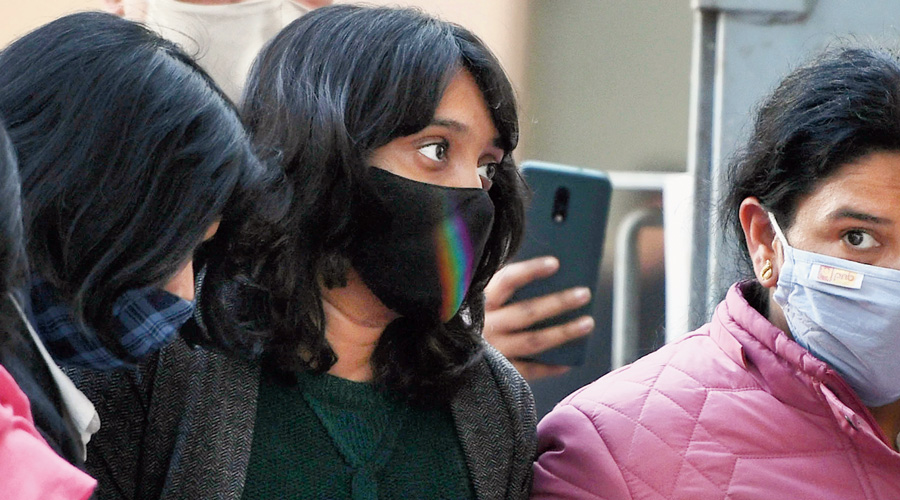Climate activist Disha Ravi, whose arrest in the toolkit sedition case had been criticised by a Delhi court as being based on “scanty and sketchy evidence”, has said she was pronounced guilty by “seekers of TRPs”.
“It’s no surprise that in the days that followed (my arrest), my autonomy was violated; my photographs were splashed all over the news; my actions were pronounced guilty — not by the court of law, but on flat screens by seekers of TRPs. I sat there unaware of the many abstractions made of me in order to satiate their idea of me,” Disha, 22, tweeted on Saturday in her first public comments after being released on bail on February 23.
Delhi police officers had whisked away Disha from her home in Bangalore on February 13 without a transit warrant from a local court. She was charged with sedition for editing and sharing a social media toolkit on mobilising support for the farmers’ strike.
The controversy around the toolkit, shared by Swedish climate activist Greta Thunberg, had been exploited to the hilt by sections of the media and politicians such as Prime Minister Narendra Modi who portrayed it as an international conspiracy to destabilise India.
Disha, one of the founding members of the Karnataka chapter of Fridays For Future, originally launched by Thunberg, wrote in the post: “All that is real feels too unreal; Delhi’s famous smog; the cyber police station; Deen Dayal Hospital; Patiala House Court and Tihar Jail. In all the years that someone had asked me where I see myself in 5 years, I would have never answered ‘jail’, but here I was.
“I kept asking myself what it felt like to be there at that particular moment of time, but I came back with no answers. I had coerced myself into believing that the only way I would be able to live through this was by tricking myself into thinking that this wasn’t happening to me — the police did not knock on my door on 13 February, 2021, they did not take my phone and laptop, and arrest me, they did not present me at Patiala House Court, the media personnel were not trying to find a place inside the room.
“As I stood in that courtroom desperately searching for my lawyers, I came to terms with the fact that I would have to defend myself. I had no idea whether there was legal assistance available; so when the judge asked me if I have anything to say, I decided to speak my mind. Before I knew it, I was sent to 5 days in police custody.”
She said she was not provided access to a lawyer when she was produced in court.
“At the end of five days (February 19) I was shifted to judicial custody for 3 days. In Tihar, I was aware of every second of every minute of every hour of every day. Locked in my cell, I wondered when it became a crime to think the most basic elements of sustenance on this planet were as mine as theirs,” she said.
“I also realised, during my time in custody, that most people knew little or nothing about climate activism or climate justice. My grandparents, who are farmers, indirectly birthed my climate activism. I had to bear witness to how water crisis affected them, but my work was reduced to tree plantation drives and clean-ups — which are important but not the same as struggling for survival.
“Climate justice is about intersectional equity. It is about being radically inclusive of all groups of people, so that everyone has access to clean air, food and water. As a dear friend always says, ‘Climate justice isn’t just for the rich and the white.’ It is a fight alongside those who are displaced, whose rivers have been poisoned, whose lands were stolen, who watch their houses get washed away every other season, and those who fight tirelessly for what are basic human rights.”
While she thanked everyone who had stood by her, Disha preferred to describe herself as “privileged” since there were those with no legal assistance in seeking bail.
“The past few days have been beyond painful, yet I know that I am one of the privileged. I was lucky enough to have excellent pro bono legal assistance but what of all those who do not? What of all those still in jail whose stories are not marketable? What of the marginalised that are not worthy of your screen time? What of those who face the world’s brazen indifference?” she asked, signing off by iterating: “Still fighting for climate justice.”











